 W
WAlbert was the King of Saxony and a member of the House of Wettin.
 W
WAlexander I was the Emperor of Russia (Tsar) between 1801 and 1825. He was the eldest son of Paul I and Sophie Dorothea of Württemberg. Alexander was the first king of Congress Poland, reigning from 1815 to 1825, as well as the first Russian Grand Duke of Finland, reigning from 1809 to 1825.
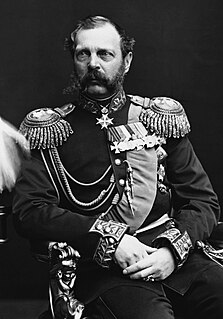 W
WAlexander II was the Emperor of Russia, King of Poland and Grand Duke of Finland from 2 March 1855 until his assassination on 13 March 1881.
 W
WAlexander III was Emperor of Russia, King of Poland and Grand Duke of Finland from 13 March 1881 until his death on 1 November 1894. He was highly reactionary and reversed some of the liberal reforms of his father, Alexander II. Under the influence of Konstantin Pobedonostsev (1827–1907), he opposed any reform that limited his autocratic rule. During his reign, Russia fought no major wars; he was therefore styled "The Peacemaker".
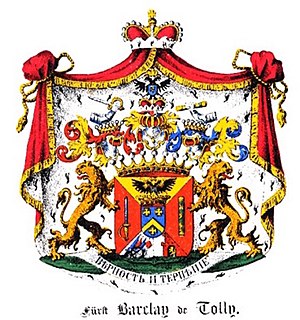 W
WPrince Michael Andreas Barclay de Tolly was a Baltic German field marshal and Minister of War of the Russian Empire during Napoleon's invasion in 1812 and the War of the Sixth Coalition. Barclay implemented a number of reforms during this time that improved supply system in the army, doubled the number of army troops, and implemented new combat training principles. He was also the Governor-General of Finland.
 W
WPrince Aleksandr Ivanovich Baryatinsky was a Russian General and Field Marshal, Prince, governor of the Caucasus.
 W
WPrince Carl Bernhard of Saxe-Weimar-Eisenach was a distinguished soldier, who, in 1815, after the congress of Vienna, became colonel of a regiment in the service of the king of the Netherlands. He fought at the Battle of Quatre Bras and the Battle of Waterloo where he commanded the 2nd Brigade of the 2nd Dutch Division and became a Chief Commander of the Royal Netherlands East Indies Army
 W
WGebhard Leberecht von Blücher, Fürst von Wahlstatt, Graf (count), later elevated to Fürst von Wahlstatt, was a Prussian Generalfeldmarschall. He earned his greatest recognition after leading his army against Napoleon I at the Battle of the Nations at Leipzig in 1813 and the Battle of Waterloo in 1815.
 W
WFriedrich Wilhelm Freiherr von Bülow, Graf von Dennewitz was a Prussian general of the Napoleonic Wars.
 W
WVice-admiral Jonkheer Theodorus Frederik van Capellen, GCMWO, KCB was a Dutch naval officer. He was married to Petronella de Lange (1779–1835). Alexandrine Tinné, female explorer and pioneering photographer, was his granddaughter.
 W
WCharles X was King of France from 16 September 1824 until 2 August 1830. An uncle of the uncrowned Louis XVII and younger brother to reigning kings Louis XVI and Louis XVIII, he supported the latter in exile. After the Bourbon Restoration in 1814, Charles became the leader of the ultra-royalists, a radical monarchist faction within the French court that affirmed rule by divine right and opposed the concessions towards liberals and guarantees of civil liberties granted by the Charter of 1814. Charles gained influence within the French court after the assassination of his son Charles Ferdinand, Duke of Berry, in 1820 and eventually succeeded his brother in 1824.
 W
WDavid Hendrik, Baron Chassé was a Dutch soldier who fought both for and against Napoleon. He commanded the Third Netherlands Division that intervened at a crucial moment in the Battle of Waterloo. In 1830 he bombarded the city of Antwerp as commander of Antwerp Citadel during the Belgian Revolution.
 W
WChristian of Hessen-Darmstadt was landgraf of the house of Hesse-Darmstadt and a Dutch general. He was also a keen Freemason, rising to grandmaster.
 W
WPrince William Augustus Edward of Saxe-Weimar-Eisenach, was a British military officer of German parents. After a career in the Grenadier Guards, he became Major General commanding the Brigade of Guards and General Officer Commanding the Home District in 1870, General Officer Commanding Southern District in October 1878 and Commander-in-Chief, Ireland in October 1885. He was promoted to field marshal in 1897 despite his career including no great military achievements.
 W
WErnest Augustus was King of Hanover from 20 June 1837 until his death. As the fifth son of King George III of the United Kingdom and Hanover, initially he seemed unlikely to become a monarch, but none of his elder brothers had a legitimate son. Ernest succeeded in Hanover under Salic law, which barred women from the succession, ending the personal union between Britain and Hanover that had begun in 1714.
 W
WAdmiral Edward Pellew, 1st Viscount Exmouth, GCB was a British naval officer. He fought during the American War of Independence, the French Revolutionary Wars, and the Napoleonic Wars. His younger brother Israel Pellew also pursued a naval career.
 W
WFranz Joseph I or Francis Joseph I was Emperor of Austria, King of Hungary, Croatia, and Bohemia, and monarch of other states of the Austro-Hungarian Empire, from 2 December 1848 until his death. From 1 May 1850 to 24 August 1866 he was also President of the German Confederation. He was the longest-reigning ruler of Austria and Hungary, as well as the sixth-longest-reigning monarch of any country in European history.
 W
WFrederick VII was King of Denmark from 1848 to 1863. He was the last Danish monarch of the older Royal branch of the House of Oldenburg and also the last king of Denmark to rule as an absolute monarch. During his reign, he signed a constitution that established a Danish parliament and made the country a constitutional monarchy. Frederick's motto was Folkets Kærlighed, min Styrke .
 W
WFrederick I was the sovereign Grand Duke of Baden, reigning from 1856 to 1907.
 W
WFrederick III was German Emperor and King of Prussia for ninety-nine days in 1888, the Year of the Three Emperors. Known informally as "Fritz", he was the only son of Emperor Wilhelm I and was raised in his family's tradition of military service. Although celebrated as a young man for his leadership and successes during the Second Schleswig, Austro-Prussian and Franco-Prussian wars, he nevertheless professed a hatred of warfare and was praised by friends and enemies alike for his humane conduct. Following the unification of Germany in 1871 his father, then King of Prussia, became the German Emperor. Upon Wilhelm's death at the age of ninety on 9 March 1888, the thrones passed to Frederick, who had by then been German Crown Prince for seventeen years and Crown Prince of Prussia for twenty-seven years. Frederick was suffering from cancer of the larynx when he died, aged fifty-six, following unsuccessful medical treatments for his condition.
 W
WFrederick William III was king of Prussia from 1797 to 1840. He ruled Prussia during the difficult times of the Napoleonic Wars. Steering a careful course between France and her enemies, after a major military defeat in 1806, he was humiliated by Napoleon, and Prussia was stripped of recent gains and forced to pay huge financial penalties. The king reluctantly joined the coalition against Napoleon in the Befreiungskriege. Following Napoleon's defeat, he took part in the Congress of Vienna, which assembled to settle the political questions arising from the new, post-Napoleonic order in Europe. His major interests were internal, the reform of Prussia's Protestant churches. He was determined to unify the Protestant churches, to homogenize their liturgy, their organization, and even their architecture. The long-term goal was to have fully centralized royal control of all the Protestant churches in the Prussian Union of Churches. The king was said to be extremely shy and indecisive. His wife Queen Louise (1776–1810) was his most important political advisor. She led a very powerful group that included Baron vom Stein, Prince von Hardenberg, von Scharnhorst, and Count Gneisenau. They set about reforming Prussia's administration, churches, finance and military.
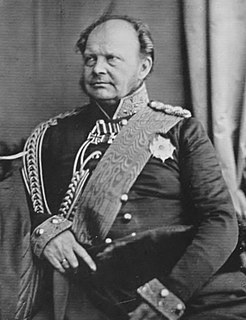 W
WFrederick William IV, the eldest son and successor of Frederick William III of Prussia, reigned as King of Prussia from 7 June 1840 to his death. Also referred to as the "romanticist on the throne", he is best remembered for the many buildings he had constructed in Berlin and Potsdam, as well as for the completion of the Gothic Cologne Cathedral.
 W
WPrince Frederick of the Netherlands, Prince of Orange-Nassau, was the second son of William I of the Netherlands and his wife, Wilhelmine of Prussia.
 W
WPrince Friedrich Karl of Prussia was the son of Prince Charles of Prussia (1801–1883) and his wife, Princess Marie of Saxe-Weimar-Eisenach (1808–1877). Prince Friedrich Karl was a grandson of King Frederick William III of Prussia and a nephew of Frederick William IV and William I. He was born in Berlin at the Royal Palace.
 W
WGeorge IV was King of the United Kingdom of Great Britain and Ireland and King of Hanover from the death of his father, King George III, on 29 January 1820 until his own death ten years later. From 1811 until his accession, he served as regent during his father's final mental illness.
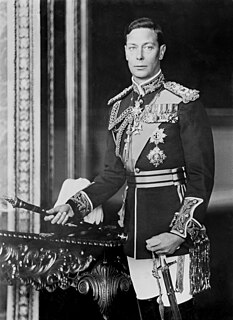 W
WGeorge VI was King of the United Kingdom and the Dominions of the British Commonwealth from 11 December 1936 until his death in 1952. He was also Emperor of India from 1936 until 1947, when the British Raj was dissolved.
 W
WAugust Wilhelm Antonius Graf Neidhardt von Gneisenau was a Prussian field marshal. He was a prominent figure in the reform of the Prussian military and the War of Liberation.
 W
WHaile Selassie I was the Emperor of Ethiopia from 1930 to 1974, and he had been Regent Plenipotentiary of Ethiopia from 1916. He is a defining figure in modern Ethiopian history. He was a member of the Solomonic dynasty who traced his lineage to Emperor Menelik I.
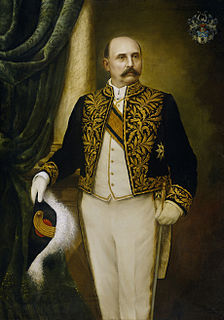 W
WJoannes Benedictus van Heutsz was a Dutch military officer who was appointed governor general of the Dutch East Indies in 1904. He had become famous years before by bringing to an end to the long Aceh War.
 W
WJonkheer Jan Willem Janssens GCMWO was a Dutch nobleman, soldier and statesman who served both as the governor of the Dutch Cape Colony and governor-general of the Dutch East Indies.
 W
WKarl Philipp, Fürst zu Schwarzenberg was an Austrian field marshal.
 W
WMajor-general Friedrich Otto Gebhard von Kielmansegg was a German soldier and officer in the service of the Kingdom of Hanover who fought during the Waterloo Campaign.
 W
WJan Hendrik van Kinsbergen, or Count of Doggersbank, was a Dutch naval officer. Having had a good scientific education, Van Kinsbergen was a proponent of fleet modernization and wrote many books about naval organization, discipline and tactics.
 W
WHendrik Merkus, Baron de Kock was a Dutch general and nobleman who served in the Batavian Navy as Lieutenant Governor-General of the Dutch East Indies from 1826 to 1830. He also was Minister of the Interior of the Netherlands from 1836 to 1841.
 W
WKonstantin Pavlovich was a grand duke of Russia and the second son of Emperor Paul I and Sophie Dorothea of Württemberg. He was the heir-presumptive for most of his elder brother Alexander I's reign, but had secretly renounced his claim to the throne in 1823. For 25 days after the death of Alexander I, from 19 November (O.S.)/1 December 1825 to 14 December (O.S.)/26 December 1825 he was known as His Imperial Majesty Konstantin I Emperor and Sovereign of Russia, although he never reigned and never acceded to the throne. His younger brother Nicholas became Tsar in 1825. The succession controversy became the pretext of the Decembrist revolt.
 W
WCorneli(u)s Rudolphus Theodorus, Baron Krayenhoff was a physicist, artist, general, hydraulic engineer, cartographer and – against his will and for only a short time – Dutch Minister of War.
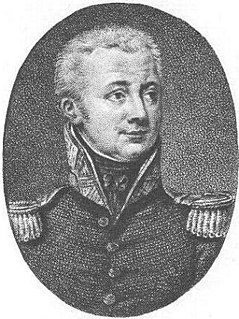 W
WLeopold Count van Limburg Stirum was a politician who was part of the Dutch triumvirate that took power in 1813 in order to re-establish the monarchy in the Netherlands.
 W
WLouis IV was the Grand Duke of Hesse and by Rhine, reigning from 13 June 1877 until his death. Through his own and his children's marriages he was connected to the British Royal Family, to the Imperial House of Russia and to other reigning dynasties of Europe.
 W
WLouis Philippe I was King of the French from 1830 to 1848 and the last French king. As Duke of Chartres he distinguished himself commanding troops during the Revolutionary Wars, but broke with the Republic over its decision to execute King Louis XVI. He fled to Switzerland in 1793 after being connected with a plot to restore France's monarchy. His father Louis Philippe II, Duke of Orléans fell under suspicion and was executed, and Louis Philippe remained in exile for 21 years until the Bourbon Restoration. He was proclaimed king in 1830 after his cousin Charles X was forced to abdicate by the July Revolution. The reign of Louis Philippe is known as the July Monarchy and was dominated by wealthy industrialists and bankers. He followed conservative policies, especially under the influence of French statesman François Guizot during the period 1840–48. He also promoted friendship with Britain and sponsored colonial expansion, notably the French conquest of Algeria. His popularity faded as economic conditions in France deteriorated in 1847, and he was forced to abdicate after the outbreak of the French Revolution of 1848. He lived out his life in exile in the United Kingdom. His supporters were known as Orléanists, as opposed to Legitimists, who supported the main line of the House of Bourbon.
 W
WLouis Antoine of France, Duke of Angoulême was the elder son of Charles X of France and the last Dauphin of France from 1824 to 1830. He was technically King of France and Navarre for less than 20 minutes before he himself abdicated, due to his father's abdication during the July Revolution in 1830. He never reigned over the country, but after his father's death in 1836, he was the legitimist pretender as Louis XIX.
 W
WGrand Duke Michael Pavlovich of Russia was a Russian prince, the tenth child and fourth son of Paul I of Russia and Sophie Dorothea of Württemberg. He was born in St. Petersburg.
 W
WNapoleon III, the nephew of Napoleon I, was the first president of France, from 1848 to 1852, and the last French monarch, from 1852 to 1870. First elected president of the French Second Republic in 1848, he seized power by force in 1851, when he could not constitutionally be re-elected, and became the emperor of the French. He founded the Second French Empire and was its only emperor until the defeat of the French Army and his capture by Prussia and its allies in the Franco-Prussian War in 1870. He worked to modernize the French economy, rebuilt the center of Paris, expanded the French overseas empire, and engaged in the Crimean War and the Second Italian War of Independence.
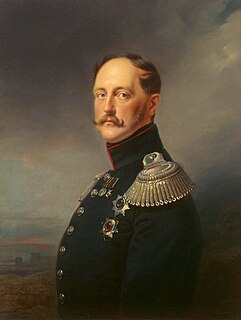 W
WNicholas I reigned as Emperor of Russia from 1825 until 1855. He was also the King of Poland and Grand Duke of Finland. He was the third son of Paul I and younger brother of his predecessor, Alexander I. Nicholas inherited his brother's throne despite the failed Decembrist revolt against him. He is mainly remembered in history as a reactionary whose controversial reign was marked by geographical expansion, economic growth and massive industrialisation on the one hand, and centralisation of administrative policies and repression of dissent on the other. Nicholas had a happy marriage that produced a large family; all of their seven children survived childhood.
 W
WOscar I was King of Sweden and Norway from 8 March 1844 until his death. He was the second monarch of the House of Bernadotte.
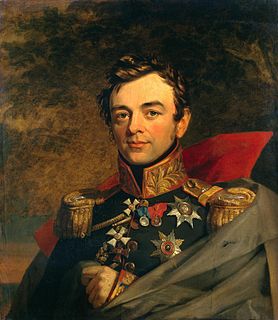 W
WCount Ivan Fyodorovich Paskevich-Yerevansky, Serene Prince of Warsaw was an Imperial Russian military leader. For his victories, he was made Count of Yerevan in 1828 and Namestnik of the Kingdom of Poland in 1831. He attained the rank of field marshal in the Russian army, and later in the Prussian and Austrian armies.
 W
WFranklin Delano Roosevelt, often referred to by his initials FDR, was an American politician who served as the 32nd president of the United States from 1933 until his death in 1945. A member of the Democratic Party, he won a record four presidential elections and became a central figure in world events during the first half of the 20th century. Roosevelt directed the federal government during most of the Great Depression, implementing his New Deal domestic agenda in response to the worst economic crisis in U.S. history. As a dominant leader of his party, he built the New Deal Coalition, which defined modern liberalism in the United States throughout the middle third of the 20th century. His third and fourth terms were dominated by World War II, which ended shortly after he died in office.
 W
WJohannes (Jan) van Swieten was a Dutch General and politician.
 W
WArthur Wellesley, 1st Duke of Wellington, was an Anglo-Irish soldier and Tory statesman who was one of the leading military and political figures of 19th-century Britain, serving twice as prime minister. He ended the Napoleonic Wars when he defeated Napoleon at the Battle of Waterloo in 1815.
 W
WWilhelm II, anglicised as William II, was the last German Emperor (Kaiser) and King of Prussia. His reign lasted from 15 June 1888 to 9 November 1918. Despite strengthening Germany’s position as a great power by building a blue-water navy and promoting scientific innovation, his tactless public statements and reckless foreign policy antagonized the international community and ultimately plunged his country into World War I. When the German war effort collapsed following a series of crushing defeats on the Western Front in 1918, he was forced to abdicate, thereby bringing an end to the Hohenzollern dynasty’s three hundred year rule.
 W
WPrince Friedrich Wilhelm Karl of Prussia was the son of Frederick William II of Prussia and Frederika Louisa of Hesse-Darmstadt.
 W
WWilhelmina was Queen of the Netherlands from 1890 until her abdication in 1948. She reigned for nearly 58 years, longer than any other Dutch monarch. Her reign saw the First and the Second World Wars, as well as the Dutch economic crisis of 1933.
 W
WWilliam I was King of Württemberg from 30 October 1816 until his death.
 W
WWilliam I or Wilhelm I of the House of Hohenzollern was King of Prussia from 2 January 1861 and the first German Emperor from 18 January 1871 to his death. William was the first head of state of a united Germany, and was also de facto head of state of Prussia from 1858 to 1861, serving as regent for his brother, Frederick William IV.
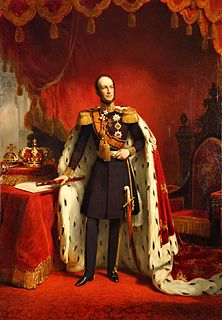 W
WWilliam II was King of the Netherlands, Grand Duke of Luxembourg, and Duke of Limburg.
 W
WKarl Philipp Josef, Prince von Wrede was a Bavarian field marshal. He was an ally of Napoleonic France until he negotiated the Treaty of Ried with Austria in 1813. Thereafter Bavaria joined the coalition.